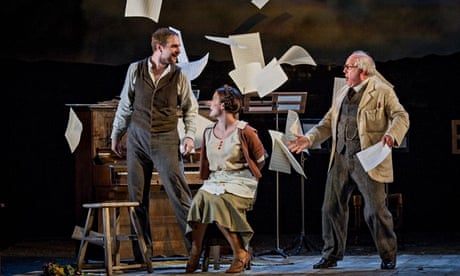The first of Buxton's full-scale festival stagings, Dvořák's comedy has not been regularly performed in the UK – though some may recall productions by Welsh National Opera and Scottish Opera in 1980 and 1995 respectively. This month's revival, however, shows it to be an eminently viable piece, made more immediately attractive through the use of Rodney Blumer's excellent translation.
The setting is Bohemia at the time of the French revolution, when the elderly Count Harasova is about to hand over his power and dominions to his wicked nephew, Adolf. The nephew has convinced Harasova that his son, Bohuš, sympathetic to progressive social policies, is in effect a dangerous revolutionary, aided and abetted by his suspiciously French wife, Julie. How the count is disabused of this false notion and reconciled with his offspring forms the main thrust of the action.
Stephen Unwin's production moves the period forward to the 1930s, bringing in a couple of brown-shirted heavies to represent the forces of evil whom Adolf associates with, but his updating has little impact on the plot, which he observes with a keenly perceptive eye. Designer Jonathan Fensom's troubled-sky backdrops and colour-co-ordinated costumes add to the show's considerable visual appeal.
The central performances are generally strong though Anne Sophie Duprels' Julie has difficulty casting off a muffled vocal quality that impedes the directness of her expression. Physically, however, she gives a good account of the caring wife who intercedes successfully with her prejudiced father-in-law.
Nicholas Lester suggests Bohuš's decency and bravery in singing that is never less than confident. James McOran-Campbell makes a suitably sly Adolf, while Andrew Greenan, stepping into the role of the count at short notice, brings dignity and pathos to his task.
The opera's second dramatic thread involves the count's puffed-up steward, Filip, delivered with appropriate petty official malevolence by Nicholas Folwell. His unwelcome attentions towards Anna Patalong's feisty Terinka – daughter of the village musician Benda, brought to life by Bonaventura Bottone – are rebuffed by her with assistance from her volatile gamekeeper boyfriend, Jiří, vitally sung and acted by Matthew Newlin. Between them, cast and director persuasively present the moral strengths of the story, with its emphasis on a community holding on to its values at a time of wider social upheaval, and a second commentary on music's ability to bind people together. Conductor Stephen Barlow, meanwhile, displays the full charm and emotional warmth of a score that is endlessly delightful.

Comments (…)
Sign in or create your Guardian account to join the discussion